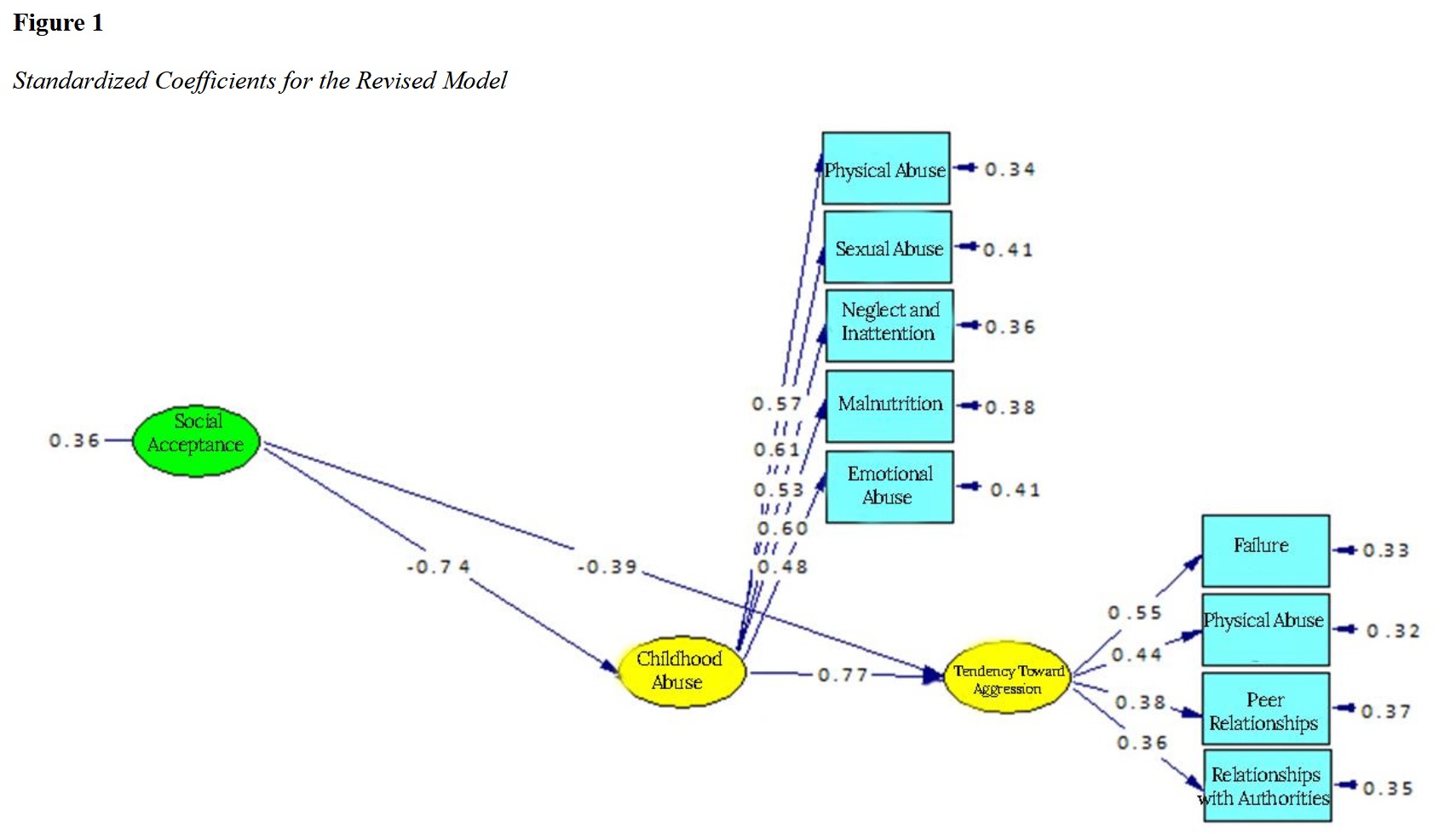Structural Modeling of the Tendency Toward Aggression Based on Social Acceptance with the Mediation of Childhood Abuse Experience in Neglected and Orphaned Children
Keywords:
Social Acceptance, Tendency Toward Aggression, Childhood Abuse ExperienceAbstract
Objective: The main objective of this study is to model the structural relationships of the tendency toward aggression based on social acceptance with the mediation of childhood abuse experience.
Methods and Materials: The research method is correlational, based on structural equation modeling. The statistical population of this study includes 309 neglected and orphaned children. Considering the number of latent variables in this study, a sample of 250 individuals was selected. The sampling method is stratified sampling. The data collection tools include the Aggression Questionnaire by Nielson et al. (2000), the Social Acceptance Questionnaire by Crowne and Marlowe (1960), and the Child Abuse Questionnaire (Self-report Scale) by Nourbakhsh (2012). Structural equation modeling was used for data analysis, and SPSS and LISREL software were employed for data processing.
Findings: The results from the research data indicate a relationship between social acceptance and childhood abuse experience and the tendency toward aggression in neglected and orphaned children. There is also a relationship between childhood abuse experience and the tendency toward aggression in neglected and orphaned children. Furthermore, a relationship exists between social acceptance and the tendency toward aggression through the mediation of childhood abuse experience in neglected and orphaned children.
Conclusion: Enhancing social acceptance may reduce aggressive behaviors and improve mental health outcomes, emphasizing the need for supportive interventions and targeted programs to address the unique challenges faced by these children.
Downloads
References
Antonopoulou, K., Chaidemenou, A., & Kouvava, S. (2019). Peer Acceptance and Friendships among Primary School Pupils: Associations with Loneliness, Self-Esteem, and School Engagement. Educational Psychology in Practice, 35(3), 339-351. https://doi.org/10.1080/02667363.2019.1604324
Atifi, F., Adelian, H., & Choupani, M. (2019). Experts' Perception of Personality Traits Affecting the Tendency Towards Child Abuse: A Phenomenological Study. Psychology Quarterly, 15(51), 1-25. https://jep.atu.ac.ir/article_10080.html
Bahmani, M., & Jahanbakhshi, Z. (2020). The Effectiveness of a Parent-Child Relationship-Based Play Therapy Intervention Program on Improving Parent-Child Interaction Quality and Reducing Aggression in Preschool Children. Counseling and Psychotherapy Quarterly, 11(44), 131-156. https://qccpc.atu.ac.ir/article_11811.html
Crum, K. I., & Moreland, A. D. (2017). Parental Stress and Children’s Social and Behavioral Outcomes: The Role of Abuse Potential over Time. Journal of Child and Family Studies, 26(11), 3067-3078. https://doi.org/10.1007/s10826-017-0822-5
Damavandian, A., Golshani, F., & Safarinia, M. (2022). The Effectiveness of Compassion-Based Therapy on Aggression, Self-Harming Behaviors, and Emotional Self-Regulation in Juvenile Delinquents. Psychological Sciences Quarterly, 21(112), 802-816. https://doi.org/10.52547/JPS.21.112.797
DeLisi, M., Pechorro, P., GonÇalves, R. A., & Maroco, J. (2021). An Antisocial Alchemy: Psychopathic Traits as a Moderator of Different Forms and Functions of Aggression in Delinquency and Conduct Disorder among Youth. International journal of law and psychiatry, 77, 101717. https://doi.org/10.1016/j.ijlp.2021.101717
Feiring, C., Simon, V. A., & Cleland, C. M. (2009). Childhood sexual abuse, stigmatization, internalizing symptoms, and the development of sexual difficulties and dating aggression. Journal of consulting and clinical psychology, 77(1), 127-137. https://doi.org/10.1037/a0013475
Ferreira, M., Aguiar, C., Correia, N., Fialho, M., & Pimentel, J. S. (2019). Friendships and Social Acceptance of Portuguese Children with Disabilities: The Role of Classroom Quality, Individual Skills, and Dosage. Topics in Early Childhood Special Education, 39(3), 183-195. https://doi.org/10.1177/0271121419864419
Ghaffari, A. A., Ghanadzadegan, H. A., & Hassan Zadeh, R. (2021). The Effectiveness of Acceptance and Commitment-Based Skills on Social Acceptance and Loneliness in Women. Family and Research Quarterly, 18(51), 107-120. https://qjfr.ir/browse.php?a_id=1914&sid=1&slc_lang=en
Jadidi, A., & Dashti, N. (2022). The Effectiveness of Virtual Social Networks on Aggression and Creative Thinking among High School Girls in Yazd. Technology and Knowledge Research in Education Quarterly, 2(3), 15-22. http://ensani.ir/fa/article/508387/
Keatley, D. A., Allom, V., & Mullan, B. (2017). The Effects of Implicit and Explicit Self-Control on Self-Reported Aggression. Personality and individual differences, 107(1), 154-158. https://doi.org/10.1016/j.paid.2016.11.046
Khanzadeh, H. (2018). The Effect of Self-Awareness Skills Training on Reducing Aggressive Behaviors, Addiction Tendencies, and Suicide. Journal of New Thoughts in Education, 14(1), 135-157. https://www.researchgate.net/publication/355164387_The_Effectiveness_of_Self-Awareness_Training_on_Reduce_Aggressive_Behavior_Addict_ability_and_the_Suicide_of_High_School_Girl_Students
Lang, R. A., Black, E. L., Frenzel, R. R., & Checkley, K. L. (1988). Aggression and Erotic Attraction Toward Children in Incestuous and Pedophilic Men. Sexual Abuse, 1(3), 417-441. https://doi.org/10.1177/107906328800100305
Mahjoub, M. (2019). The Role of Parenting Styles, Child Abuse Experience, and Emotional Safety in Bullying-Related Behaviors among Students University of Mohaghegh Ardabili]. https://uma.ac.ir/find-31.8193.21772.fa.html
Mikaeili, N., & Rahimzadegan, S. (2021). Predicting Aggression in University Students Based on Corona Anxiety, Cognitive Empathy, and Emotional Empathy. Psychology Quarterly, 10(11), 50-60. https://www.researchgate.net/publication/360089343_The_Prediction_of_university_students_aggression_based_on_corona_anxiety_cognitive_empathy_and_affective_empathy
Moreira, D. (2024). Addressing the Complex Links Between Psychopathy and Childhood Maltreatment, Emotion Regulation, and Aggression—A Network Analysis in Adults. Behavioral Sciences, 14(2), 115. https://doi.org/10.3390/bs14020115
Mukul, S., & Ajita, N. (2021). Aggresssion in School Children: Role of Gender, Family Factors and Exposure to Violence. medRxiv, 2021.2003.2025.21254374. https://doi.org/10.1101/2021.03.25.21254374
Pourmohseni, F., & Niksarsh, M. (2022). Investigating the Role of Psychopathic Personality Traits and Aggression in Tendency towards Substance Abuse in Students with Conduct Disorder Symptoms. Addiction Research Quarterly, 16(63), 223-244. https://doi.org/10.52547/etiadpajohi.16.63.223
Prachi, C. (2024). Aggression Caused by Anxiety in Smokers and Non Smokers. International Journal for Multidisciplinary Research, 6(3). https://doi.org/10.36948/ijfmr.2024.v06i03.19350
Riggs, S. A., & Kaminski, P. (2019). Childhood emotional abuse, adult attachment, and depression as predictors of relational adjustment and psychological aggression. In The Effect of Childhood Emotional Maltreatment on Later Intimate Relationships (pp. 75-104). Routledge. https://doi.org/10.4324/9781315874920-4
Shirali, E. (2021). An Inquiry into Violence and Child Abuse in Tehran. Iranian Social Issues Review, 13(1), 199-224. https://ijsp.ut.ac.ir/article_90410.html?lang=en
Vahedi, M., & Kabiri, A. A. (2022). The Effectiveness of Philosophy for Children Program with Technology Enrichment on Happiness and Rumination in Orphaned and Abandoned Girls. Counseling and Psychotherapy Quarterly, 13(49), 163-192. https://qccpc.atu.ac.ir/article_12658.html
Warmingham, J. M., Rogosch, F. A., & Cicchetti, D. (2020). Intergenerational Maltreatment and Child Emotion Dysregulation. Child Abuse and Neglect, 102, 104377. https://doi.org/10.1016/j.chiabu.2020.104377
Zhang, J. (2020). The Effect of Structured Empathy Education on Empathy Competency of Undergraduate Nursing Interns: A Quasi-Experimental Study. Nurse Education Today, 85, 104296. https://doi.org/10.1016/j.nedt.2019.104296

Downloads
Additional Files
Published
Submitted
Revised
Accepted
Issue
Section
License
Copyright (c) 2024 Saeideh Azadmanesh (Author); Afsaneh Khajevand Khoshli (Corresponding Author); Leila Azizi (Author)

This work is licensed under a Creative Commons Attribution-NonCommercial 4.0 International License.














